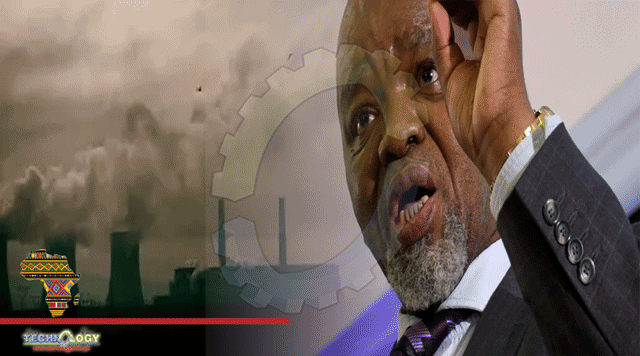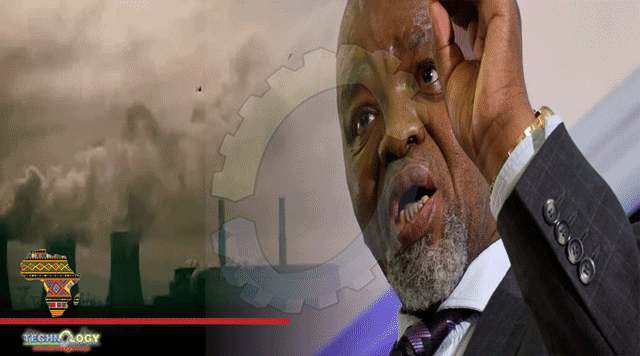The energy minister said that rushing to shut down coal power plants is not the solution, and will lead to costlier electricity, fewer jobs and damage the economy.

he South African Youth Economic Council hosted an energy summit gala dinner on Thursday, where Mineral Resources and Energy Minister Gwede Mantashe gave a keynote address in which he discussed South Africa’s just transition plan and its developmental economic objectives.
What is the just transition?
Mantashe said, “So, to me, it’s a transition from high carbon emissions to low carbon emissions.
“People are simplistic about it, they say it’s a transition from coal to renewables. And I’m saying, no, no, no. It’s a transition from high carbon emission to low carbon emission.”
Mantashe cited the objectives of the National Development Plan – to provide reliable and efficient energy service at competitive rates, to provide an energy sector that is socially equitable through expanded access to energy and affordable tariffs and to provide an energy sector that is environmentally sustainable to reduce emissions and pollution.
“Now, that’s where the debate is,” said Mantashe in regard to the third objective.
Mantashe views holding on to coal as looking out for the livelihoods of the people who depend on it.
He said that he told Deputy President David Mabuza to take a helicopter from Johannesburg to Nelspruit.
“He is from Mpumalanga. He was shocked to see the stretch between Belfast and Delmas where coal mining and coal-generated power stations are located and remain.
“And I said to him, whatever decision we take, we must appreciate that it is not coal that is staying in Belfast to Delmas – it is human beings. They stay there, they earn a living, they live a livelihood in that area.”
Mantashe added that his experience working with coal makes him able to relate to the people who would be affected by the just transition.
“I spent seven years in that area mining coal, so I know exactly how people relate to that coal. And therefore any programme that we’re going to take, must be systematic, it must protect livelihoods, it must protect lives.”
“In your debate, factor in the impact of energy poverty, where people can’t have access to energy and meaningfully benefit from energy.”
Mantashe’s justification for coal
Mantashe jokes about his infamous titles as “coal fundamentalist”, “fossil fuel dinosaur” and, recently, “worst polluter of the year”, but says that he is committed to South Africa’s international commitments to respond to the climate crisis.
“We’re committed to that – we’ll continue to invest in clean energy technologies towards net zero emissions.”
Mantashe said his department is always presented as a coal fundamentalist but the biggest allocation of growth in energy is in renewables.
Mantashe noted that by 2021, at least 5,422 megawatts from the Renewable Independent Power Producer Programme were already connected to the grid and that the department is committed to the procurement of 6,422 megawatts of renewable energy up to bid window five.
“But when you read newspapers, they will not tell you that story,” said Mantashe.
His argument is that South Africa must get the most out of the coal power stations the country already has.
“When we talk about experimenting with clean coal technologies, people immediately give me papers, that we’ll take you to court on this. But the reality of the matter is that it’s a resource that the country has; let’s experiment with this.”
Mantashe said that South Africa has 16 coal-fired power stations providing about 75% of the country’s electricity generation, and by 2030 is it estimated to be 60%.
“You don’t destroy what you have on the basis of hope that something better is coming. You build for the future on what you know and what you have. So that approach to me is scientific, is systematic, it protects the present ability of the state to supply energy.”
He said that rushing to shut down coal power plants is not the solution, and will lead to costlier electricity, fewer jobs and damage the economy.
“[Coal] has made a huge contribution to the economy. It is growing, it is generating revenue… it is doing well.
“Now, what do we do with it, do we set it alight and destroy it? My argument is that let’s allow it to benefit as long as it can.
“In mining, I can say that without fear or favour, that one of the sectors of mining that has actually transformed, is coal. There’s a number of black coal mining owners. And any rush to destroy that sector will not leave that transformation agenda unhurt. So, we have a duty to protect that sector, grow it and make it make an impact on society.”
COP26 and financial deal
At the COP26 finance negotiations last year, the European Union, Germany, France, the UK and the US pledged R131-billion to support South Africa’s climate action goals, in the form of grants, concessional loans and investment and risk-sharing instruments.
“They will not give us that money,” said Mantashe. “They will give [it to] us if we take it as a loan bearing interest rates. That is how it works, that is what the world is like.”
He added that in our context R131-billion is R50-billion short for financing the upgrade of the national grid infrastructure.
Mantashe emphasised that what came out of COP26 was to phase down unabated coal power and inefficient fossil fuel subsidies – not phase out coal.
“They say you must phase down, meaning that we must be systematic in dealing with the exit from coal. To tell the truth, the whole of Glasgow said these commitments made by some are based on technologies that are yet to be developed. And this is at best reckless and, at worst, dangerous.”
Addressing young people during his speech, Mantashe said, “I don’t want you to inherit any future. I want you to build that future. If you want to build it, then you shape the kind of future you want.”
Kanakana Mudzanani, the president of the SA Youth Economic Council, told Daily Maverick after Mantashe’s address: “I think the minister gave a clear clarity that young people must take part in these kinds of conversations.
“As a country, if we are to indeed conserve our environment, at the same time ensuring that we have sustainable energy, we need to get more young people involved. And he brought young people through a journey of what coal means to a vast majority of South Africans, what coal means to quite a lot of people and how if we are to transition, we’ve got to understand that we must not be transitioning in the name of hope. But we must ensure that the transition gives people jobs.
“On behalf of the council, we are largely concerned about the environment. I think we agree fully with a call that we need to conserve it.
“However, it’s a question of, are we going to have the ability to conserve the environment, but at the same time, ensure that we maintain and uphold people’s livelihoods?
“So, if we transition, and that transition leads us to a worse condition, I do not think it would be appreciated. So, let’s prioritise livelihoods but at the same time, let’s not neglect the environment.”
Source: Daily Maverik
